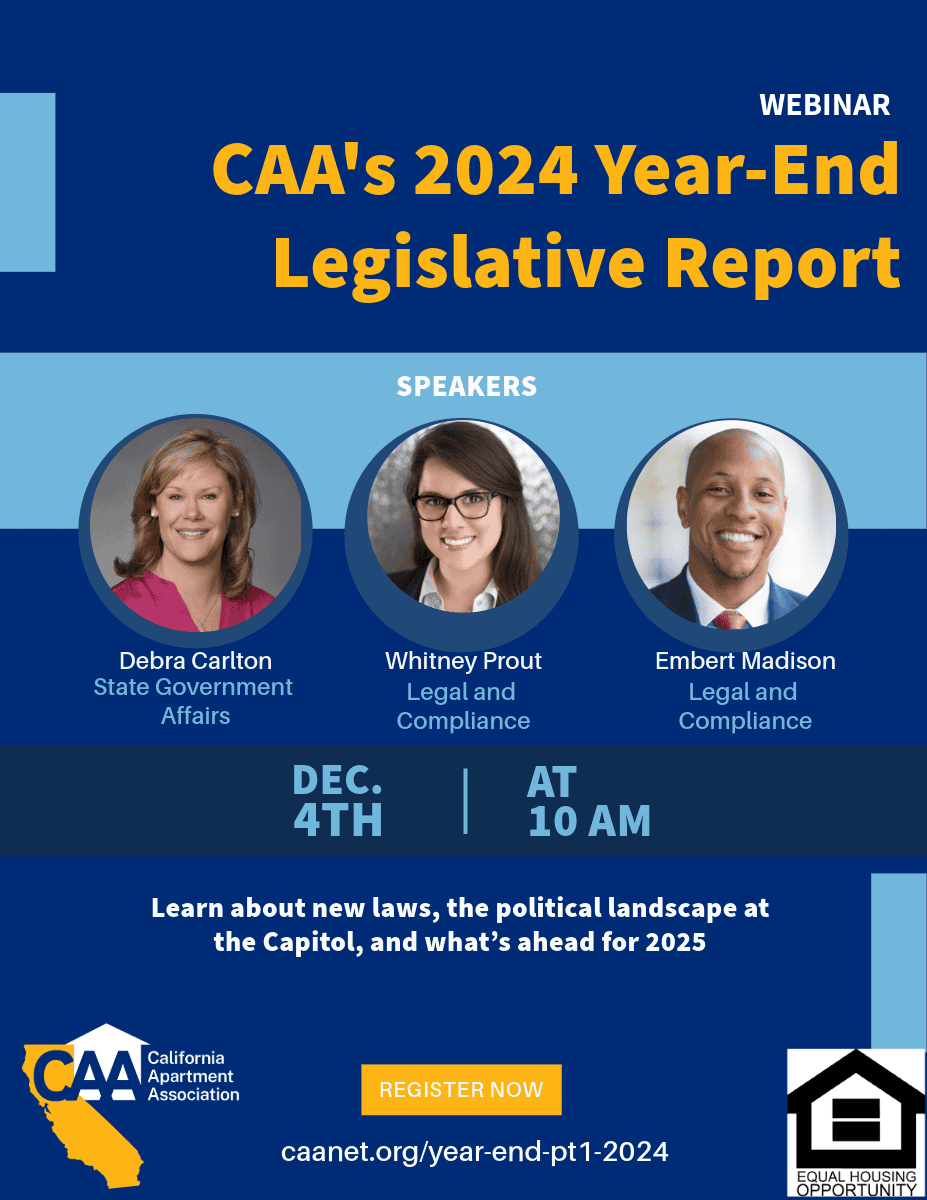As we do each year, the California Apartment Association weighed in on hundreds of rental housing-related bills at the state Capitol. We successfully stopped the most problematic bills from reaching the governor’s desk, while helping ensure that the bills that did make it to the governor were amended to be more workable for rental property owners. In the paragraphs that follow, we review some of the bills signed into law that will affect your everyday rental operations. Unless otherwise indicated, each of these laws will take effect Jan. 1, 2025.
Tenant screening
This law provides that landlords or their agents may charge a potential tenant an application screening fee only if the landlord or their agent, at the time the application screening fee is collected, accepts applications in the order in which the completed applications are received and approves the first applicant to meet the landlord’s established screening criteria. It also requires that the landlord’s screening criteria be provided to the applicant in writing together with the application at the time the application is requested. This law was enacted through AB 2493, authored by Assemblywoman Gail Pellerin, D-Santa Cruz.
Security deposits
This law provides that a landlord who collects a security deposit must take photographs of the unit:
- Immediately before, or at the start of the tenancy.
- Within a reasonable time after the unit is returned to the landlord, but prior to any repairs or cleaning for which the landlord will make a deduction from the security deposit.
- Within a reasonable time after repairs or cleaning are completed.
The landlord must provide these photographs to the departing tenant. Beginning April 1, 2025, the landlord must take photographs of the unit within a reasonable time after the possession of the unit is returned to the landlord. For tenancies that begin on or after July 1, 2025, the landlord must take photographs of the unit immediately before, or at the start of, the tenancy. This law was enacted through AB 2801, authored by Assemblywoman Laura Friedman, D-Glendale.
Rent reporting – market rate housing
This law requires a residential rental property owner to offer tenants the option of having their positive rental payment information reported to at least one nationwide consumer reporting agency. For leases entered into on and after April 1, 2025, the offer of reporting positive rental payment information must be made at the time of the lease agreement and at least once annually thereafter. For existing leases, as of Jan. 1, 2025, the offer of positive rental payment information reporting must be made no later than April 1, 2025, and at least once annually thereafter.
Owners may charge tenants a fee to cover actual costs, not to exceed $10 each month, to pay for the cost of reporting the positive rent payments. This law does not apply to the following:
The owner of a residential rental building that contains 15 or fewer dwelling units, unless both of the following apply:
- The landlord owns more than one residential rental building, regardless of the number of units in each building.
- The landlord is one of the following:
- A real estate investment trust, as defined.
- A corporation.
- A limited liability company in which at least one member is a corporation.
This law was enacted through AB 2747, authored by Assemblyman Matt Haney, D-San Francisco.
Rent reporting – affordable housing
This law deletes the existing Jan. 1, 2025, repeal date. It continues in place the requirement that owners of an assisted housing development offer tenants the option to have their rental payments reported to at least one consumer reporting agency. Landlords may charge tenants the actual cost, not to exceed $10 each month, to cover the cost of reporting.
Just like AB 2747 outlined above, this law does not apply to buildings with 15 or fewer dwelling units, with exceptions as outlined above. This law was enacted through SB 924, authored by Sen. Steven Bradford, D-Gardena.
Fees and notices
This law prohibits landlords and their agents from charging a tenant any fee for payment by check for rent or a security deposit. It also prohibits landlords and their agents from charging a tenant a fee for serving, posting, or delivering any notice, as described.
After April 1, 2025, if a landlord or their agent charges a military service member a higher-than-standard or advertised security deposit, the lease agreement must include a statement about the amount of the higher fee and an explanation of why the higher security deposit is being charged. The law requires the additional amount of security deposit to be returned to the tenant after no more than six months if the tenant is not in arrears for any rent due during that period. This law was enacted through SB 611, authored by Sen. Caroline Menjivar, D-Burbank.
Domestic violence
This law requires landlords to change the locks for a tenant, at the landlord’s own expense, within 24 hours of being provided information that a tenant or a member of the tenant’s household has been a victim of abuse or violence. If the landlord fails to change the locks, the landlord must reimburse the tenant within 21 days if the tenant changes the locks. The tenant must notify the property owner within 24 hours that the locks have been changed and must provide the landlord with a key. This law was enacted through SB 1051, authored by Sen. Susan Eggman, D-Stockton.
Eviction process
This law extends the requirement for a tenant to file an answer to an unlawful detainer complaint from five days to 10 days. It also shortens the time for a hearing on specific motions that have typically been used by tenant attorneys to delay an eviction for up to 35 additional days. This law was enacted through AB 2347, authored by Assemblyman Ash Kalra, D-San Jose.
Balconies – inspection extension
This law extends by one year the deadline for property owners to perform balcony inspections and other exterior elevated elements in all buildings containing three or more multifamily dwelling units. The deadline is moved from Jan. 1, 2025, to Jan. 1, 2026. This law was enacted through AB 2579, authored by Assemblywoman Sharon Quirk-Silva, D-Fullerton.
For a complete list of all bills signed by Gov. Gavin Newsom, see CAA’s Legislative Chart. CAA will also host a webinar with more details about the laws outlined above. Click the digital flier below to learn more.


